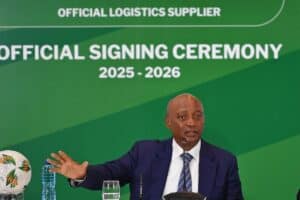The former president says he supports the government's efforts to engage Trump to understand his 'sudden change'.

Former president Thabo Mbeki says South Africa has had a cordial relationship with US President Donald Trump’s Republican Party for decades and is failing to understand the “sudden” shift.
Mbeki explained that the Trump of the second term differs from the Trump of the first.
Trump served his first term in 2017 and lost to Joe Biden in 2020 in an election riddled with allegations of vote rigging by his supporters.
In 2020, Lana Marks served as the US ambassador to South Africa and conveyed positive intentions from the US toward the country.
ALSO READ: Trump picking on SA triggering spike in economic uncertainty – economists
She said at the time of her appointment in 2020: “Molweni Mzansi! Masisebenzisane! We are stronger together, and I will use my time in South Africa to expand our trade and business partnerships and to support SA’s efforts to achieve HIV epidemic control. I believe strongly in the role that youth can and must play in leading the way to a more prosperous future, and we remain committed to investing in South Africa’s next generation of civic, government, and business leaders.”
First-term Trump vs second term
According to Mbeki, it was Trump’s directive for Marks to show goodwill to the South African government.
“During Trump’s first term, the ambassador made it clear to me that in terms of what she had to do in South Africa, it was in agreement with the government. Why this sudden change? Even with President Trump? When he was president in the first term, he insisted that with regard to US policy to South Africa, his ambassador, Lana Marx, would have to ensure she was acting with consent to our government,” Mbeki told the SABC on Monday.
“Even with [former] president [George] Bush, we worked very well with him. He told his secretaries in my presence: ‘You people must not make any major decisions about Africa without consulting South Africa’. Even how they dealt with South Africa about South African policy, it was the same. He told them: ‘We don’t just impose our wishes on them, we discuss with them.’
ALSO READ: Will SA compromise with Trump? Fears standoff could spark economic freefall
“We differed with them on a number of issues, but there was never any imposing of sanctions because we differed. Why this 180 turn? I can’t account for it. It’s not typical of the Republican Party as we have known them for 50 years.”
‘180-degree turn’
Mbeki said the least he could expect from the US was to request a meeting with President Cyril Ramaphosa to seek clarity before making drastic decisions.
“To depend on an absolute fabrication like we’re persecuting the Afrikaners, they don’t even discuss it. I would have expected that if they had gotten that kind of information, they would come so we could explain it. But no, they don’t.
ALSO READ: Trump’s tough stance on SA could be a negotiation tactic
“They take a decision based on complete falsehood and impose an Executive Order. I’m saying I honestly don’t understand it. I agree with the position that our government has taken, that it should directly engage the Trump administration.
“Maybe that engagement will come to know what has changed because this is a radical change completely out of the blue with regard to the behaviour of the Republican Party in the US towards us. It’s a radical change overnight. It’s unproductive; it’s not going to produce anything positive.”
Last week, Trump signed an executive order to cut funding for South Africa. This was amid false claims of white genocide and the signing of the Expropriation Act.
Trump accused South Africa of “doing very bad things” and human rights violations.
ALSO READ: Trump’s SA executive order: The ANC, DA and GNU’s conundrum
However, the United Nations (UN) said on Monday it had found no evidence of Trump’s allegations.
“I would refer you to the work our human rights bodies have been doing, which do not find this particular information. Obviously, there are human rights concerns about South Africa that we have expressed to the government, but these are not part of what we have been talking about,” said deputy spokesperson for the UN, Secretary-General Farhan Haq.
Support for South Africa
Meanwhile, there has been an outpouring of support for the South African government.
President of the European Union Council Antonio Costa and Ramaphosa had a “positive” phone conversation in which Costa shared the EU’s commitment to South Africa.
ALSO READ: Weekly Economic Wrap: Mostly Trump with a little bit of Ramaphosa
“On my phone call with President Cyril Ramaphosa, I highlighted the EU’s commitment to deepen ties with South Africa as a reliable and predictable partner,” Costa shared on social media.
“I look forward to the bilateral South Africa summit on 13 March. I expressed the EU’s full support to South Africa’s leadership of G20 and its ambition to strengthen multilateral cooperation and the Pact for the Future to address the most pressing global issues.”
Chinese Ambassador to South Africa Wu Peng has also expressed his country’s commitment to strengthening ties with South Africa.
The Ambassador also confirmed Chinese Foreign Minister Wang Yi’s attendance at the G20 Foreign Ministers’ Meeting in Johannesburg from 20 to 21 February.
The German Ambassador Andreas Peschke has also followed suit.
Support Local Journalism
Add The Citizen as a Preferred Source on Google and follow us on Google News to see more of our trusted reporting in Google News and Top Stories.






